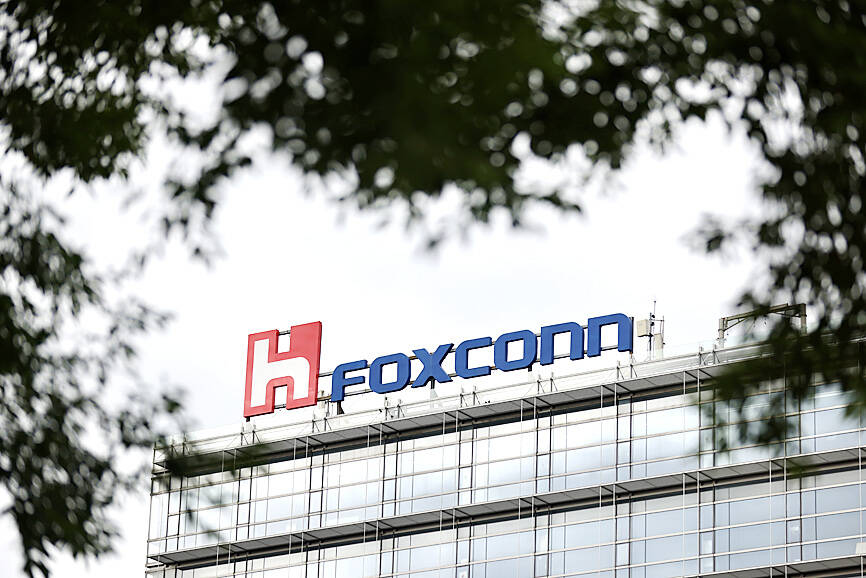The world’s biggest producer of iPhones is going to outer space.
Two prototype low Earth orbit (LEO) satellites made by Hon Hai Precision Industry Co (鴻海精密), better known as Foxconn Technology Group (富士康科技集團), took off aboard a Space Exploration Technologies Corp (SpaceX) rocket from Vandenberg Space Force Base in southern California on Saturday.
The launch of the LEO satellites marks a key moment for the Taiwanese electronics manufacturer as it diversifies into new sectors — a shift that is taking on greater urgency as some of its established businesses such as smartphones and laptops struggle. Hon Hai is aiming to demonstrate that it has satellite technology to tap growing demand for communications from space.

Photo: EPA-EFE
While Elon Musk’s SpaceX has made and launched more than 5,000 LEO satellites for its Starlink constellation, Hon Hai is betting it would be able to make satellites primarily for corporate and government clients.
The satellites, codeveloped with Taiwan’s National Central University, are the size of a backpack, weigh about 9kg each and carry cameras, communication devices and other equipment. They are designed to orbit Earth every 96 minutes at an altitude of 520km.
The company has in recent years looked for ways to diversify — focusing on electric vehicles (EVs), digital health and robotics, as well as technologies for artificial intelligence, semiconductors and communications satellites.
Revenue is expected to drop about 6 percent this year to NT$6.2 trillion (US$191.6 billion), Bloomberg News estimates show.
While Apple Inc needs millions of iPhones sold per quarter and frequently updates models, customers could go a long time between orders for LEO satellites, so the business is much less predictable, said Tim Farrar, president of Telecom, Media and Finance Associates Inc, a consulting firm in Menlo Park, California. Hon Hai makes about two out of every three iPhones in the world.
For an outsourcing manufacturer like Foxconn, “Unless you can find another one that comes along at the right moment, your life can be very difficult,” he said.
Government orders could provide the company with some security as it builds out its satellite business, Farrar said.
“Foxconn is thinking, if the Taiwanese government gives us a baseline of orders every year, that will be OK,” he said.
Taiwan is working on a plan to launch its first LEO communications satellite, part of a strategy to develop space-based alternatives to the undersea cables that provide most of the nation’s Internet connections.
Another line of support would be the company’s EV business since they require real-time communication technology, MasterLink Securities Corp (元富證券) analyst Jason Wang (王琮生) said.
“You need to have a solution in place for your car to use,” Wang said. “If they want to export this business, they at least need to have an infrastructure in place to demo the technology in Taiwan.”
The company’s background in electronics and know-how gained from making smartphones, game consoles and other devices should help with that.
“Taiwan is very good at making all different kinds of commercial products in electronics,” Academia Sinica’s Institute of Astronomy & Astrophysics research fellow Wang Shiang-yu (王祥宇) said. “These companies can easily switch” to space.

TRADE WAR: Tariffs should also apply to any goods that pass through the new Beijing-funded port in Chancay, Peru, an adviser to US president-elect Donald Trump said A veteran adviser to US president-elect Donald Trump is proposing that the 60 percent tariffs that Trump vowed to impose on Chinese goods also apply to goods from any country that pass through a new port that Beijing has built in Peru. The duties should apply to goods from China or countries in South America that pass through the new deep-water port Chancay, a town 60km north of Lima, said Mauricio Claver-Carone, an adviser to the Trump transition team who served as senior director for the western hemisphere on the White House National Security Council in his first administration. “Any product going

TECH SECURITY: The deal assures that ‘some of the most sought-after technology on the planet’ returns to the US, US Secretary of Commerce Gina Raimondo said The administration of US President Joe Biden finalized its CHIPS Act incentive awards for Taiwan Semiconductor Manufacturing Co (TSMC, 台積電), marking a major milestone for a program meant to bring semiconductor production back to US soil. TSMC would get US$6.6 billion in grants as part of the contract, the US Department of Commerce said in a statement yesterday. Though the amount was disclosed earlier this year as part of a preliminary agreement, the deal is now legally binding — making it the first major CHIPS Act award to reach this stage. The chipmaker, which is also taking up to US$5 billion

High above the sparkling surface of the Athens coastline, the cranes for building the 50-floor luxury tower centerpiece of Greece’s future “smart city” look out over the Saronic Gulf. At their feet, construction machinery stirs up dust. Its backers say the 8 billion euro (US$8.43 billion) project financed by private funds is a symbol of Greece’s renaissance after the years of financial stagnation that saw investors flee the country. However, critics see it more as a future “ghetto for the rich.” It is hard to imagine that 10km from the Acropolis, a new city “three times the size of Monaco”

STRUGGLING BUSINESS: South Korea’s biggest company and semiconductor manufacturer’s buyback fuels concerns that it could be missing out on the AI boom Samsung Electronics Co plans to buy back about 10 trillion won (US$7.2 billion) of its own stock over the next year, putting in motion one of the larger shareholder return programs in its history. South Korea’s biggest company would repurchase the stock in stages over the coming 12 months, it said in a regulatory filing on Friday. As a first step, it would buy back about 3 trillion won of paper starting today up until February next year, all of which it would cancel. The board would deliberate on how best to effect the remaining 7 trillion won of buybacks. The move